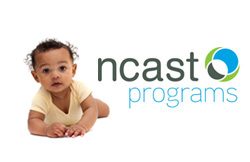In the late 1960’s, researchers began to investigate how to identify children at risk for failure to thrive, abuse or neglect. In 1971, Dr. Barnard, scientific consultant to NCAST, initiated research that brought the ecology of early child development closer to the level of clinical practice by developing methods for assessing behaviors of children and parents. She identified environmental factors that are critical to a child’s well-being and demonstrated the importance of parent-child interaction as a predictor of later cognitive and language development.
Methods that Barnard developed, widely known as the Feeding and Teaching Scales, were initially taught in 1979 in a series of eight classes via satellite in the U.S.A. Over 600 nurses received training in the use of a series of tools for assessing parent-child interactions during those sessions. After the satellite experiment ended, NCAST Programs, under the direction of Georgina Sumner, now Director Emeritus, started offering a Certified Instructor Workshop in Seattle for professionals. These individuals gained reliability in the use of the Feeding and Teaching Scales and were certified to teach the scales to learners in their own communities.
NCAST became a self-sustaining, organization that reached beyond traditional academic or continuing education programs to advance knowledge around the world for the benefit of families & children.
The Feeding and Teaching Scale program was updated in 1994 and is currently known as the Parent-Child Interaction (PCI) Program. Since its beginning, NCAST has trained over 800 Certified Instructors representing almost every state in the U.S. and several foreign countries. NCAST’s Certified Instructors have trained more than 20,000 health care professionals in the use of the PCI Feeding and Teaching Scales which have been applied in many settings, including state & county health departments, community outreach programs, hospitals, clinics and universities and in various disciplines such as public health nursing, social work, child care, physical and occupational therapy, psychology, psychiatry, and pediatrics.
The PCI Feeding & Teaching Scales are also widely used in research all over the world. They have been used in major studies including the Administration of Children, Youth and Families’ study, the Memphis New Mother Project, The David Olds Study and the Early Childhood Longitudinal Study, Birth Cohort, Comprehensive Child Care programs and projects promoted by the National Committee to Prevent Child Abuse, to name a few.
In 2001, Dr. Jean Kelly became the new Director of NCAST. NCAST Programs became NCAST-AVENUW Programs and now represents the work of faculty from the Department of Family-Child Nursing and the Center for Human Development and Disability. NCAST-AVENUW Programs continues to develop programs to assist professionals working with infants, young children and families. All NCAST-AVENUW programs are backed by research findings and proven effective.
Other NCAST-AVENUW programs include:
